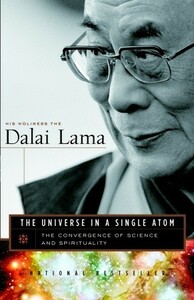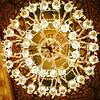Take a photo of a barcode or cover
Often people think of religion and science to exist separably, but this book explains how they can coexist - at least somewhat. My issue with the book, is that I found only two chapters to be particularly interesting and easy to read. The rest seemed to be written with the "challenge" of needing be put as many 3+ syllable words in a sentence as possible which made the book seem a bit drawn out and wordy. Additionally, some of the examples given seemed to be cut short and did not seem to necessarily jive with the rest of the chapter. Overall, it was an interesting read, but I think the book could have been condensed and more reader-friendly.
I didn’t realize this is an older book, so the knowledge is not new to me, as I probably read it elsewhere, however I still enjoyed it. As a Buddhist myself, I appreciate the Dalai Lama’s view on religion vs science or more so, how the two can compliment each other. This book really reads like a conversation with ramblings, flowing as if coming from a train of thought, but also supported with evidence and examples. His intellectual knowledge on the topics is admirable and he represents both sides with great compassion. What I appreciate most about this book, is his honesty in regards to the Buddhist religion itself, understanding that the certain subjects within the religion can be revisited and improved on or further explained. He also leaves room and challenges us to come up with our own thoughts and conclusions.
The Dalai Lama says we need both science and religion (or philosophy) because there are some things that can't be answered by just one or the other.
This is going on the stack again for a second read. The Universe in a Single Atom is a highly compelling look at the social responsibility scientists should assume in order to earn our trust and respect. The book starts with the demonstration of how physicists have helped us know our universe at the micro and macro level. Tenzin Gyatso, His Holiness the Fourteenth Dalai Lama, admits that he struggles to fully understand these posits, but does not disregard the work of great minds. This is good, because this is the stuff I struggled to fully comprehend too. There is so much scientific detail and information given in chapter three, "Emptiness, Relativity, and Quantum Physics," hence my need for a second read.
Later chapters on ethics and the study of sentience speak to the need to NOT reduce our unique experiences as humans to chemistry, neurology, and biology. "At the fundamental level, quantum mechanics tells us that it is impossible to predict accurately how a particle might behave in a given situation. One can, therefore, make predictions about the behavior of particles only on the basis of probability. If this is so, no matter how powerful one's mathematical formulas might be, since our knowledge of the initial conditions of a given phenomenon or an event will always be incomplete, we cannot fully understand how the rest of the story unfolds."
The Universe in a Single Atom is the Dalai Lama's call to both scientists and laypeople to concern ourselves with the pace of technology. We can appreciate and respect our scientific advances, but we should also take caution that each of these can have far-reaching and unpredictable outcomes affecting our planet and our people.
Later chapters on ethics and the study of sentience speak to the need to NOT reduce our unique experiences as humans to chemistry, neurology, and biology. "At the fundamental level, quantum mechanics tells us that it is impossible to predict accurately how a particle might behave in a given situation. One can, therefore, make predictions about the behavior of particles only on the basis of probability. If this is so, no matter how powerful one's mathematical formulas might be, since our knowledge of the initial conditions of a given phenomenon or an event will always be incomplete, we cannot fully understand how the rest of the story unfolds."
The Universe in a Single Atom is the Dalai Lama's call to both scientists and laypeople to concern ourselves with the pace of technology. We can appreciate and respect our scientific advances, but we should also take caution that each of these can have far-reaching and unpredictable outcomes affecting our planet and our people.
I've been a Hawking fan for years, but couldn't quite reconcile science with religion till I read this book. This was my introduction to the Dalai Lama, and I felt very comfortable first understanding his background and his curiosity, and, of course, his wisdom, as he explains, explores how empirical science and spirituality can coexist. In fact, one cannot exist without the other. I still have a lot of trouble with the Big Bang Theory, but am able to wrap my head around it a little better when you can add religion to the mix. Not mutually exclusive anymore. And I especially liked the Dalai Lama's humble way of presenting. The book felt friendly and not pedantic.
This was a very interesting read. Tenzin Gyatso (His Holiness The Dalai Lama) has led a very interesting life and this book describes his deep interest and knowledge of science. He gives a very clear outline of complicated scientific theories before relating them to Buddhist philosophy, how they are similar and how they differ.
Anyone with an interest in science and spirituality should definitely consider reading this book :-)
Anyone with an interest in science and spirituality should definitely consider reading this book :-)
challenging
emotional
informative
medium-paced
A deep philosophical blending and questioning of Buddhist ethics and beliefs with scientific thought, theory, and research. While starting to feel a bit dated, it’s a good read for anyone interested in the spiritual sides of science.
informative
inspiring
reflective
slow-paced
1 less star purely for the fact that this is quite scientifically technical. The Dalai Lama knows more about quantum physics and neuroscience than most of us will ever understand. But on the whole it’s great. I’d suggest to read this as an audiobook to push past the scientifically dense stuff and get to the more ethical and philosophical parts.




